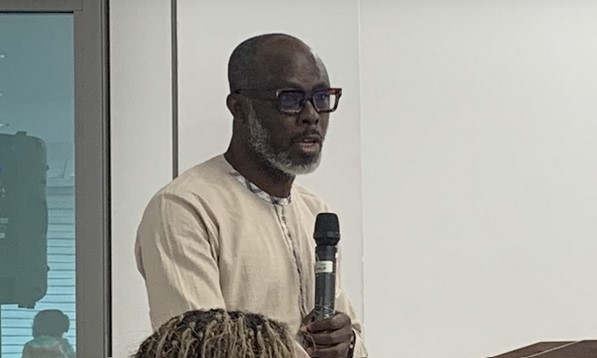
By Prosper Agbenyega
The Executive Director of Nuclear Power Ghana (NPG), Dr. Stephen Yamoah, has issued a strong caution against proposals to introduce floating nuclear power plants into Ghana’s energy mix, warning that such a move could derail the country’s carefully structured nuclear agenda and damage its international reputation.
Speaking at the close of a two-day media workshop in Accra, Dr. Yamoah said the idea of adopting Russia’s Floating Nuclear Power Plant (FNPP) technology does not align with Ghana’s long-term nuclear development strategy. He stressed that the country’s nuclear roadmap, which has been developed in accordance with the International Atomic Energy Agency’s (IAEA) milestone approach, is built around a land-based nuclear power plant, not a floating one.
“Ghana without a nuclear power plant is much better than Ghana with a floating nuclear power plant,” Dr. Yamoah declared. “The nuclear agenda is not just about generating electricity—it’s about building industry, creating jobs, and adding value to our natural resources.”
No Place for Floating Technology in Ghana’s Nuclear Plan
According to Dr. Yamoah, extensive feasibility studies, vendor evaluations, and technology assessments undertaken during the first two phases of Ghana’s nuclear programme never considered floating reactors as an option.
“No vendor ever proposed floating technology,” he stated. “This idea appears to be a market-driven attempt to sell electricity at unknown costs, not a serious national project.”
He warned that deviating from the established nuclear framework to pursue untested technologies could weaken Ghana’s credibility within the international nuclear community and slow progress toward achieving full nuclear energy readiness.
“If we dilute our focus, the international community will begin to see Ghana as an unserious country that doesn’t know what it wants,” he cautioned.
Government’s Interest in Floating Nuclear Units
Dr. Yamoah’s remarks come in response to recent statements by Dr. Robert Mawuko Sogbadji, Deputy Director in charge of Alternative and Nuclear Energy at the Ministry of Energy and Green Transition, who revealed that Russia had expressed interest in deploying three floating power units of 100MW each in Ghana.
Speaking at the World Atomic Week celebration in Moscow, Dr. Sogbadji explained that floating nuclear plants offer flexibility, mobility, and scalability, making them attractive for short-term power needs.
He noted that such plants could potentially help bridge Ghana’s energy supply gap more quickly than traditional land-based reactors.
NPG: Focus on Long-Term, Sustainable Energy
However, Dr. Yamoah disagreed with this line of thinking, insisting that nuclear energy should not be treated as a quick-fix solution to Ghana’s power challenges.
“No country uses nuclear energy to solve short-term power problems,” he said. “It must be developed as a long-term, reliable base-load power source that drives industrialization and supports energy security.”
The NPG Executive Director reaffirmed the corporation’s commitment to advancing the land-based nuclear power project, emphasizing that the initiative is part of Ghana’s broader industrialization agenda.
He explained that the ongoing site characterization process — the step preceding reactor construction — is crucial to ensuring environmental safety, technical suitability, and compliance with IAEA standards.
“Our focus remains clear—we see nuclear power as a catalyst for job creation, technology transfer, and sustainable development,” Dr. Yamoah stressed.
Media’s Role in the Nuclear Agenda
The remarks were made at a media capacity-building workshop themed “Media Practice: A Bridge in Building Sustainable Community Development.” The training sought to equip journalists with the knowledge and skills to report accurately on nuclear issues and promote informed public discourse.
Speakers at the workshop, including Nana Amoasi VII, former Executive Director of the Institute of Energy Security, and Albert Kofi Owusu, General Manager of the Ghana News Agency, highlighted the media’s role in building public confidence and ensuring transparency in Ghana’s energy transition.
“The media must move beyond headlines and provide sustained scrutiny,” said Ms. Adiki Ayitevi, Director of iFORA CommeEX. “Nuclear power is not just a technological issue—it’s about trust, safety, and accountability.”
A Defining Moment for Ghana’s Nuclear Future
As Ghana moves closer to selecting a site and a vendor for its first nuclear power plant, Dr. Yamoah’s warning serves as a clear signal that the country’s nuclear policy must remain focused and consistent.
“We cannot afford to be distracted by short-term interests,” he said. “The nuclear programme is a strategic national project — one that will define Ghana’s energy security and industrial future for generations to come.”

